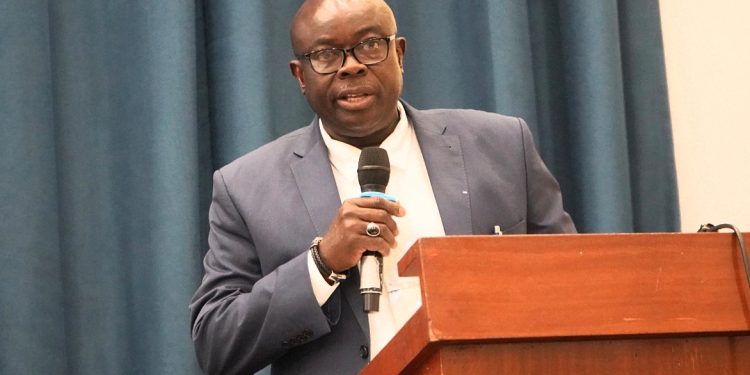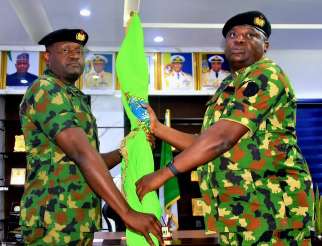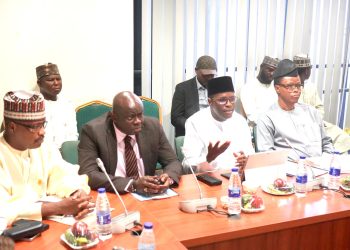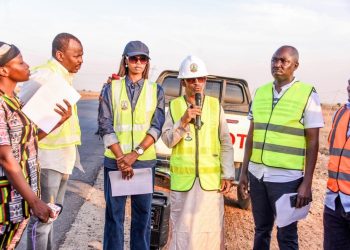By Nkechi Eze
As part of activities marking the 2025 African Union (AU) Anti-Corruption Day, the Chairman of the Independent Corrupt Practices and Other Related Offences Commission (ICPC), Dr. Musa Adamu Aliyu, SAN, has called for a more balanced approach in the fight against corruption, one that safeguards the dignity and fundamental rights of citizens.
Speaking at a high-level seminar organised to commemorate the event on Friday, July 11, 2025, at the Shehu Musa Yar’Adua Centre in Abuja, Dr. Aliyu stressed the importance of integrating human rights principles into anti-corruption strategies. The event was organised by the Technical Unit on Governance and Anti-Corruption Reforms (TUGAR) in collaboration with the Inter-Agency Task Team (IATT).
In a paper titled “Promoting Human Dignity in the Fight Against Corruption: The Role of the Judiciary, Law Enforcement Agencies and Other Critical Stakeholders”, the ICPC boss represented by the Secretary to the Commission, Mr. Clifford Oparaodu, DSSRS, highlighted what he described as the “dignity paradox” of anti-corruption efforts. He warned that while corruption deprives citizens of basic services such as healthcare, education, and justice, the methods used to curb it could also violate human rights if not properly managed.
“While corruption reduces the quality of life by denying citizens access to basic services like healthcare, education, and justice, the methods used to combat it, if not properly managed, can also violate human rights,” he said.
Dr. Aliyu urged stakeholders including the judiciary, law enforcement agencies, Civil Society Organisations (CSOs), the media, and the private sector to play an active role in ensuring that anti-corruption efforts do not come at the cost of human dignity. He called on the judiciary to uphold fair trials and due process, and advised law enforcement agents to ensure ethical investigation procedures that prevent abuse of power.
He also emphasised the role of CSOs in monitoring human rights and promoting legal advocacy. Addressing media practitioners, he urged them to be responsible in their reporting and avoid sensationalism or media trials that may cause unwarranted reputational damage. “It is important for media practitioners to avoid media trials and hasty news disseminations which mostly end up in unwarranted reputational damage since it ignores the patience of waiting for valid court verdicts on matters,” he noted.
The ICPC Chairman also called on the legislature to enact laws that protect whistleblowers and witnesses, adding that ordinary citizens must be encouraged to report corruption through safe and confidential mechanisms. “The war against corruption can only be won through collective efforts that respect the rights and dignity of all individuals. The battle against corruption can be won, if you support it. We must have personal commitment and the zeal to fight this hydra-headed monster,” he declared.
Delivering the welcome address, Mrs. Jane Onwumere, Head of TUGAR and Secretariat to the IATT, described the 2025 theme as timely, noting that corruption goes beyond legal infractions and has deep human consequences. “Corruption is not just a financial or legal issue; it is a violation of fundamental rights of everyone,” she said. “This year’s theme challenges us all to connect the dots between integrity and human dignity to ensure that anti-corruption strategies do not merely punish wrongdoing, but protect the well-being of citizens.”
The event was also marked across various states by ICPC offices, including Oyo State, where a road walk and public awareness campaign were held in Ibadan. The procession, which moved through major streets of the city, aimed to sensitise the public on the importance of integrity and transparency in governance. It drew participation from several stakeholders, including members of the National Youth Service Corps (NYSC), who joined the campaign for a corruption-free society.

















